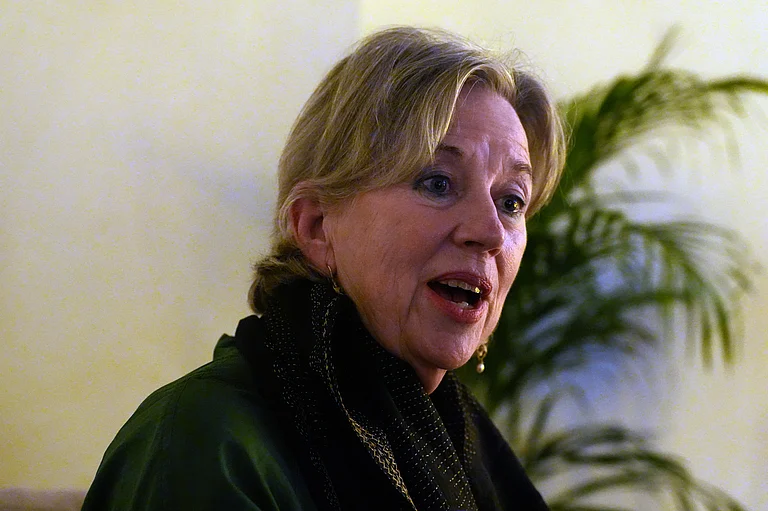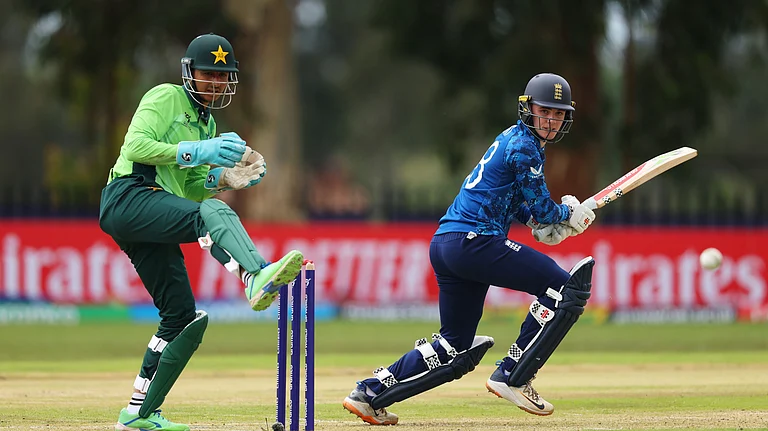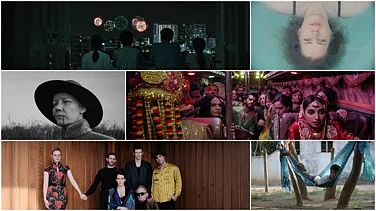His six-decade-long Paris life didn’t wane late S.H. Raza’s curiosity about the developments in Hindi literature, so much so the renowned artist would ring up his scholar-friend Ashok Vajpeyi—and talk for hours. A keen listener, the “fellow Bundelkhandi” painter was always a reluctant speaker, recalls the critic-translator-editor, adding that Raza let his works do the articulation.
That inter-continental telephonic conversation had begun in the 1980s. Raza returned to India in 2011, went on to be conferred with the Padma Vibhushan and died five years later at age 94. The loss of his friend last July led Vajpeyi to form a cultural organisation that is into a variety of the arts—visual and performing. Recently, the Raza Foundation organised a three-day literary festival that concluded earlier this week, featuring 45 poets from 15 Indian languages converge in the national capital. The country’s first biennale of poetry celebrated verses of all kinds from April 7 to 9, interspersed with panel discussions hosting writers and intellectuals.

VAK: The Raza Biennale of Indian Poetry got off to a start with a classical bhajan recital by young Hindustani classical vocalist Bhuvanesh Komkali. The set of bhakti sonnets and compositions he presented with a team of percussionists for an hour was inspired by the distinct style of his grandfather musician Kumar Gandharva and the legend’s son Mukul Shivputra. The session at Triveni Kala Sangam in the presence of academics, students and others from various universities and colleges was followed by the release of a special book Vajpeyi co-edited with art writer Shruthi Issac. The 218-page work contained the works the participating poets at the biennale presented before the audience.
Senior litterateur Keki N. Daruwalla triggered off discussion at a session by contending that “a little amnesia” will help the contemporary shake off the shackles of the past, adding poetry was an important counterweight against the canonisation of myth as memory.

“The danger of myth becoming scripture and memory, as something to be remembered as having lived or occurred is something we must all be wary of. This sort of cooption—the darker side of memory—is linked to nostalgia. A little amnesia would benefit us all,” he added, and linked the conflation of myth with historical and racial anger and distrust.
Vajpeyi joined in, saying all kinds of memories today were being manufactured, erased, or suppressed. “There is a kind of amnesia prevalent today. Poetry is a jar of memory, reminding and rehabilitating memory,” he added as the moderator of the discussion that saw rebuttals from social scientist Shiv Visvanathan and Gujarati poet-playwright Sitanshu Yashaschandra.
In an earlier session the weekend, Malayalam poet and theorist K. Satchidandan observed that the best kind of poetry often happens when when poetry is impossible. “The freedom to disturb and agitate is one of the most important rights a poet has, especially in the history we find ourselves living in today. Poetry is the freedom to conceive, to create alternative worlds, different ways of seeing, going beyond reality to escape it,” he said. “Or perhaps even oppose the real and inhabit other realities.”

The fellow panelists at the Vajpeyi-anchored session were former NCERT director Krishna Kumar, award-winning author and academic Ananya Vajpeyi and Apoorvanand, professor of Hindi at DelhiUniversity.
Ananya described poetry as the “last refuge” against tendencies of systemic oppression and reductionism, while Apoorvanand lamented the need to talk about freedom in this, the 70th year of Indian Independence, contending that was nevertheless the duty ofpoets to be “bound inextricably with the fates and caprices of the human condition: to be in the thick of things”.
For Kumar, changes to colonial-era structures of pedagogical instruction would help spread awareness of the distinctness of poetry and its importance as both medium and agent of expression and experimentation.
The final day’s evening, too, witnessed an animated session what with socio-cultural analyst Ashis Nandy describing disciplines like poetry, music and the arts as “primeval, innate and true”, and going on to claim that the ‘un-socialisable’ nature of the poetic act meant it was an exercise in conscience.
“A poet's conscience is not a prescribed societal conscience. Poetry is among those disciplines over which our cognitive, civilised selves exert little control. Nobody can become a good poet without surrendering to its form. The best poetry involves self-confrontation. It is not only an expression of the self, but a method to deal with the anti-self within,” he added.
Iranian philosopher Ramim Jahanbegloo, Interspersing anecdotes from his personal experience as a political prisoner after the revolution in Iran with Socratic theory, said, “Conscience is where ethics and art merge together as in poetry. Poetry is an act of self-acknowledgement and self-assessment wherein the poet’s inner voice lends awareness and reinforces the poetic mind. Therefore, a poet's conscience is where life and destiny join together.”
Hindi poet Udayan Vajpeyi proposed that there existed a rather unique relationship between morality and aesthetic that poetry drew from and added to. “Poetry activates and makes vital the conscience, and unlike politics, does not allow one to surrender morality to a generalised sense of ethics, beauty and consciousness. Poetry by its being, proposes and evokes morality in the reader. Being conscious of the individually subjective nature of dispositions, inclinations and aesthetic conceptions is what sets apart all artists, including poets.”
Among other notable poets at the biennale were P.P. Ramachandran (Malayalam), Sharmila Ray (English), Kanji Patel (Gujarati), H.S. Sivaprakash (Kannada), Mangalesh Dabral (Hindi), Pratim Baruah (Assamese), Arundhathi Subramaniam (English) and Subodh Sarkar (Bengali), Haraprasad Das (Odia), Nilim Kumar (Assamese), Salma (Tamil), Ratan Thiyam (Manipuri) and Majrooh Rashid (Kashmiri).
The Raza Foundation is looking ahead to the next edition of the biennale: a festival of Asian Poetry in 2019. “We have seen poets, young and old, from across linguistic, idiomatic and geographic divides gather here in a reflection and celebration of the plurality of an India on the move,” Vajpeyi says.


























